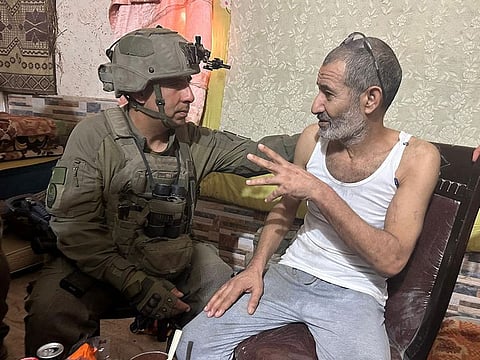Israeli hostage rescued from Gaza after 10 months: Army
Hostage rescues are rare, but Israeli forces have so far rescued alive eight captives

GAZA STRIP: The Israeli military said it rescued an Israeli hostage in Gaza on Tuesday, more than 10 months after he was seized during the Hamas attacks that sparked a devastating war.
Kaid Farhan Alkadi, a 52-year-old Israeli Bedouin, was abducted by Palestinian militants during the October 7 Hamas attack on Israel, the military said in a statement.
“Alkadi was rescued... in a complex operation in the southern Gaza Strip,” the statement said, adding that he was in a stable condition and being transferred to a hospital for a medical check-up.
Alkadi is from Rahat, a predominantly Arab town. On October 7, he had been working as a guard at a warehouse in southern Israel when he was seized by militants.
Israeli campaign group the Hostages and Missing Families Forum described his rescue as “miraculous”.
“However, we must remember that military operations alone cannot free the remaining hostages who have suffered 326 days of abuse and terror,” it said, insisting that only a ceasefire could ensure the return of other captives.
“A negotiated deal is the only way forward.
“We urgently call on the international community to maintain pressure on Hamas to accept the proposed deal and release all hostages,” it said.
Prime Minister Benjamin Netanyahu said Israel was “working tirelessly to bring all our hostages back”, in a video issued shortly after he spoke with Alkadi.
“We are doing this in two main ways: through negotiations and through rescue operations. Both approaches require our military presence on the ground and continuous military pressure on Hamas.”
Hostage rescues are rare, but Israeli forces have so far rescued alive eight captives since the ground military campaign in Gaza began on October 27. Seven hostages have been freed since a week-long truce ended in November.
On October 7, militants attacked southern Israeli communities in an unprecedented attack, which resulted in the deaths of 1,199 people, mostly civilians, according to an AFP tally based on official Israeli figures.
Militants also seized 251 people, 104 of whom are still captive in Gaza, including 34 the military says are dead.
Israel’s retaliatory military campaign since then has killed at least 40,476 people in Gaza, according to the health ministry of the Hamas-run territory.
Most of the dead are women and children, according to the UN rights office.
The United States struck a cautious note of optimism on Monday regarding efforts to clinch a Gaza ceasefire and the release of the remaining hostages.
Their fate is central to ongoing truce talks in Cairo, with relatives and supporters piling pressure on the Israeli government in weekly protests demanding their return home.
In Washington, National Security Council spokesman John Kirby told reporters “there continues to be progress” and that the talks would continue and involve “working groups” for several days.
A key sticking point in the talks has been Israel’s insistence on keeping control of the so-called Philadelphi Corridor along the Gaza-Egypt border, to stop Hamas from rearming, something the militant group has refused to countenance.
Cairo, which has been mediating the talks alongside Qatar and the United States, insisted on Monday that “it will not accept any Israeli presence” along the corridor, Egyptian state-linked Al-Qahera news reported, citing a high-level source.
Humanitarian fears
The more than 10 months of war in Gaza have so far seen only one truce that lasted for a week starting November 24.
During that period 105 hostages were released in exchange for 240 Palestinian prisoners.
Tuesday’s hostage rescue came as the violence showed no signs of abating in a war that has ravaged Gaza, displaced nearly all of its population at least once and triggered a humanitarian crisis.
It also came as the United Nations warned of the worsening humanitarian situation in the territory, where the Israeli army ordered a new evacuation and carried out more deadly strikes.
The UN Office for the Coordination of Humanitarian Affairs said such orders “severely” hampered its “ability to deliver essential support and services”.
In the latest violence, Gaza’s civil defence agency said at least 11 Gazans, including three children from the same family, were killed in Israeli strikes on two refugee camps in central Gaza and Khan Yunis in the south.
“We woke up to the sound of the explosion and shrapnel flying at us,” said Mohammed Yussef, who witnessed one of the strikes in Al-Maghazi refugee camp.
“We came here and found dead and mutilated children and women. They have nothing to do with the resistance. People are dying in vain and there is no safe area in Gaza. Where do we go?”
Sign up for the Daily Briefing
Get the latest news and updates straight to your inbox


